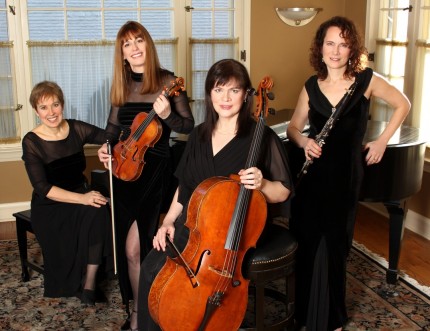Orion Ensemble opens season admirably with early and late Brahms

For the first concert of their 21st season, the Orion Ensemble chose to take on two of the richest of Brahms’ chamber works—music fully suited to their considerable strengths as performers, and which they played with authority and depth of feeling.
The two wind trios, and, especially, the Horn Trio written in 1865, contain some of the composer’s most emotionally satisfying music, richly scored and melodic. The Clarinet Trio, written some 28 years later, has many of the same qualities as the earlier work albeit in more condensed form.
The Orion soloists, performing at Nichols Hall in Evanston Sunday evening, were individually distinctive and well-integrated as a group, displaying an understanding of the music built on long familiarity. The many bright spots in the performance, and the overall energy that abounded more than compensated for some fleeting technical issues.
The Horn Trio was the first work completed after the death of the composer’s mother and the personal significance of the work was further signaled by his choice of the natural horn, which was his father’s instrument.
Guest artist Gregory Flint played a valved horn, which produced a tone that at times sounded dry in the hall’s acoustic. Florentina Ramniceanu’s violin was also affected by the surroundings, but in spite of the venue issue and some rough horn attacks, the balance among the three instruments was solid and Diana Schmuck‘s radiant pianism cleanly projected.
The opening slow movement sets an emotional tone, which is deeply felt. The second movement is a scherzo that combines folkish elements with darker passages leading to the third movement’s pervading melancholy.
The soul of this work is the Adagio Mesto, in which the artists fully brought out the funereal aspect of the score. The horn was especially emotive here, stark and at times ardent rising to a full-throated and solemn ending.
The galloping main theme set the pace for the vigorous Allegro con brio finale, fully realized by the artists and enthusiastically received by the sizable audience.
For the Clarinet Trio, Schmuck was joined by Orion members clarinetist Kathryne Pirtle and cellist Judy Stone. This austere music of Brahms’ sunset years features in the first movement a subtle interplay with back-and-forth exchanges, sensitively rendered by the performers.
The second movement Adagio stars the cello as much as the clarinet and Stone’s rich sound was exemplary. The third movement, a short and sweet Andantino grazioso was handled fluently, sounding almost like salon music. The last movement was by turns brusque and flowing with Schmuck’s light-fingered piano work holding it all together.
The concert ended with Paul Schoenfield’s playful and jazzy Café Music, written in 1986 but sounding like a hyper-energized relic of the age of Gatsby. The trio of violin, cello and piano relished the humor and mastered the syncopated idiom of the three contrasting movements with admirably cohesive teamwork.
Posted in Uncategorized

